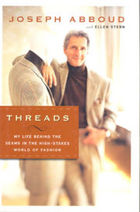In a case that illustrates the dangers of using your own name as a trademark, a court has issued a permanent injunction preventing fashion designer Joseph Abboud from using his own name to promote a new line of clothing – and all future goods and services. The unfortunate aspect of this ruling that hinders Abboud’s planned return to the fashion industry, is that a more careful drafting of the agreements that were part of the sale of his company in 2000 could have prevented his unintended loss of rights.
 Trademark attorneys for the popular designer apparently believed that when he agreed to sell his company and trademarks – which included the USPTO registered Joseph Abboud trademark – it would not prevent him from later using his own name to promote his affiliation with a new clothing line. The Court disagreed and issued a permanent injunction preventing the designer from using his own name to promote his new “jaz” fashion line. CLICK HERE for the Court’s decision.
Trademark attorneys for the popular designer apparently believed that when he agreed to sell his company and trademarks – which included the USPTO registered Joseph Abboud trademark – it would not prevent him from later using his own name to promote his affiliation with a new clothing line. The Court disagreed and issued a permanent injunction preventing the designer from using his own name to promote his new “jaz” fashion line. CLICK HERE for the Court’s decision.
Use Caution When Assigning Trademark Rights
In 2000, Abboud sold his company, JA Apparel Corp., for $65.5 million. As a condition of the sale, he then worked at the company under a personal services agreement until it expired in 2005, at which point he left the company for good over “creative differences.”
The personal services agreement also contained a non-competition provision, whereby Abboud agreed not to compete with the company for a period of two years after the termination of the agreement. It was after this period had lapsed that Abboud announced the launch of his new “jaz” clothing line, which does not include the Joseph Abboud name.
Abboud testified at the trial that he had only assigned the rights to use “Joseph Abboud” as a trademark and had reserved the right to use his own name to inform the public that he is the designer of the new “jaz” clothing line. The Court did not agree:
[I]f Abboud only intended to convey trademarks, then the Agreement could have and should have said: “Abboud agrees to sell…all of [his] right, title and interest in and to the trademarks identified on Schedule 1.1(a)(A).” But it said more than that, and in order to give the word “names” due meaning and effect, the Court must interpret the Agreement in a manner that provides JA Apparel with that which it expressly purchased – all of Abboud’s rights to use his name for commercial purposes . . . [T]he Court concludes that Abboud’s proposed use, in connection with his new “jaz” clothing line, of the phrases “a new composition by designer Joseph Abboud” and “by the award-winning designer Joseph Abboud,” would constitute a breach of [ ] the Agreement – irrespective of whether these phrases constitute trademark use.
A Permanent Setback
Aside from the breach of contract issue, the court also concluded that “Abboud’s proposed use of his name in connection with the “jaz” line would also constitute trademark infringement” because there would be a likelihood of confusion among consumers, dismissing Abboud’s fair use defense in the process.
Accordingly, the Court concludes that Plaintiff JA Apparel is entitled to a permanent injunction prohibiting Abboud from using his name – personally, through Houndstooth, or through any other entity with which he is affiliated –to market, advertise, promote, sell, offer to sell, or otherwise distribute any goods or services, including, but not limited to, his new “jaz” clothing line, to the consuming public.
The Full Effect of Non-Compete Agreements
It was also revealed that during the non-competition period Abboud and his attorney conducted numerous meetings with third parties in the garment industry and negotiated verbal agreements for Abboud’s return to the fashion industry.
Although the negotiated agreements were not formally executed until shortly after the expiration of the non-compete period, the Court found that Abboud violated the non-compete provision by engaging in “impermissible association with individuals or entities that were proposing to engage in competition with JA Apparel during the Restricted Period.”
The Court, however, refused to grant plaintiff monetary relief, because the new venture lost money, or order return of shipped garments that were already displayed in third-party stores. But the order makes clear that no further sales or promotions may be made using “Joseph Abboud” in any way on the new “jaz” clothing line. The case is titled: JA Apparel Corp. v. Joseph Abboud, et al., No. 07-Civ. 7787 (THK), U.S. District Court for the Southern District of New York.
PRACTICE NOTE: This case illustrates the dangers of using your own name as a trademark or service mark in your business. It also emphasizes the need for careful drafting of assignments and licensing agreements to prevent the unintended loss of rights – e.g. use of your own name in a subsequent business. Also, trademark rights could unintendedly be lost through bankruptcy proceedings because trademarks are an asset of the bankruptcy estate.
Another reason to avoid using names as trademarks or business names is that they are descriptive and not protectable without establishing secondary meaning. Michael Atkins’ post discusses how The Christensen Law Firm lost its domain names because they were not protectable trademarks.
 Los Angeles Intellectual Property Trademark Attorney Blog
Los Angeles Intellectual Property Trademark Attorney Blog

